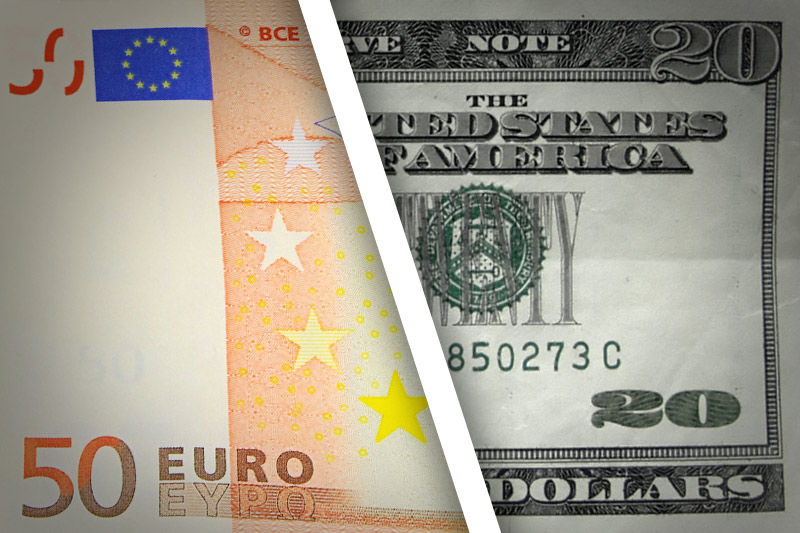Investing.com - The euro rose against the U.S. dollar on Friday, after the release of disappointing U.S. jobs data fuelled fresh uncertainty over whether the Federal Reserve will soon begin tapering its stimulus program, but gains were capped by downbeat German economic reports.
EUR/USD hit 1.3179 during European afternoon trade, the session high; the pair subsequently consolidated at 1.3144, rising 0.18%.
The pair was likely to find support at 1.3052, the low of July 16 and resistance at 1.3255, the high of August 30.
In a report, the Bureau of Labor Statistics said the U.S. economy added 169,000 jobs in August, less than the expected 180,000 increase, after a downwardly revised 104,000 rise the previous month.
The report also showed that the U.S. private sector added 152,000 jobs last month, compared to expectations for a 180,000 rise, following a downwardly revised increase of 127,000 in July.
The U.S. unemployment rate ticked down to 7.3% in August, from 7.4% in July, as more people left the workforce. Analysts had expected the unemployment rate to remain unchanged last month.
The euro's gains were limited however by downbeat economic reports out of Germany. Earlier Friday, official data showed that German industrial production dropped 1.7% in July, compared to expectations for a 0.5% fall, after a downwardly revised 2% rise the previous month.
A separate report showed that Germany's trade surplus narrowed unexpectedly to EUR14.5 billion in July, from an upwardly revised surplus of EUR15.8 billion the previous month. Analysts had expected the trade surplus to expand to EUR16.1 billion in July.
The single currency also remained under pressure after European Central Bank President Mario Draghi on Thursday said the central bank's monetary policy will remain accomodative for as long as necessary and that interest rates should remain at present or lower levels for an extended period of time.
The euro was lower against the pound with EUR/GBP slipping 0.18%, to hit 0.8403.
Also Friday, official data showed that U.K. manufacturing production rose 0.2% in July, confounding expectations for a 0.3% rise, after an upwardly revised 2% increase in June.
A separate report showed that the U.K. trade deficit widened to GBP9.85 billion in July, from a dwonwardly revised deficit of GBP8.17 billion the previous month. Analysts had expected the trade deficit to narrow to GBP8.15 billion in July.
In addition, the Bank of England said that inflation expectations for the third quarter ticked down to 3.2% from 3.6%. in the three months to June.
Data also showed that U.K house prices rose less-than-expected in August, ticking up 0.4% after a 0.9% increase the previous month. Analysts had expected house prices to rise 0.7% last month.
EUR/USD hit 1.3179 during European afternoon trade, the session high; the pair subsequently consolidated at 1.3144, rising 0.18%.
The pair was likely to find support at 1.3052, the low of July 16 and resistance at 1.3255, the high of August 30.
In a report, the Bureau of Labor Statistics said the U.S. economy added 169,000 jobs in August, less than the expected 180,000 increase, after a downwardly revised 104,000 rise the previous month.
The report also showed that the U.S. private sector added 152,000 jobs last month, compared to expectations for a 180,000 rise, following a downwardly revised increase of 127,000 in July.
The U.S. unemployment rate ticked down to 7.3% in August, from 7.4% in July, as more people left the workforce. Analysts had expected the unemployment rate to remain unchanged last month.
The euro's gains were limited however by downbeat economic reports out of Germany. Earlier Friday, official data showed that German industrial production dropped 1.7% in July, compared to expectations for a 0.5% fall, after a downwardly revised 2% rise the previous month.
A separate report showed that Germany's trade surplus narrowed unexpectedly to EUR14.5 billion in July, from an upwardly revised surplus of EUR15.8 billion the previous month. Analysts had expected the trade surplus to expand to EUR16.1 billion in July.
The single currency also remained under pressure after European Central Bank President Mario Draghi on Thursday said the central bank's monetary policy will remain accomodative for as long as necessary and that interest rates should remain at present or lower levels for an extended period of time.
The euro was lower against the pound with EUR/GBP slipping 0.18%, to hit 0.8403.
Also Friday, official data showed that U.K. manufacturing production rose 0.2% in July, confounding expectations for a 0.3% rise, after an upwardly revised 2% increase in June.
A separate report showed that the U.K. trade deficit widened to GBP9.85 billion in July, from a dwonwardly revised deficit of GBP8.17 billion the previous month. Analysts had expected the trade deficit to narrow to GBP8.15 billion in July.
In addition, the Bank of England said that inflation expectations for the third quarter ticked down to 3.2% from 3.6%. in the three months to June.
Data also showed that U.K house prices rose less-than-expected in August, ticking up 0.4% after a 0.9% increase the previous month. Analysts had expected house prices to rise 0.7% last month.
